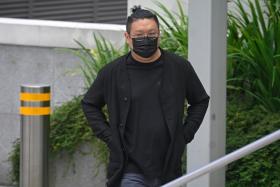Self-radicalised individuals are main terror threat to Singapore: ISD
While averted attacks underscore threat of lone-actor strikes, far-right extremism is also an emerging threat
Self-radicalised individuals who are influenced by violent extremist materials online are the main terrorism threat facing Singapore, the Internal Security Department (ISD) said in a report released yesterday.
And while Islamist terrorism remains a key concern, far-right extremism, which espouses racial supremacy, anti-Islam and anti-immigration ideas, is an emerging threat, it said in the third edition of its Singapore Terrorism Threat Assessment Report.
ISD said while there is currently no specific and credible intelligence of an imminent terrorist attack against Singapore, it had averted terrorist attacks by two Singaporean youths targeting places of worship here.
"These cases underscore the very real threat of lone-actor attacks by self-radicalised individuals," it added.
In both cases, online videos and material played a part in influencing a 20-year-old full-time national serviceman who planned to attack and kill Jews leaving a synagogue, and a 16-year-old student who intended to attack Muslims at two mosques on the second anniversary of the Christchurch attacks in New Zealand.
ISD said that 44 out of the 54 individuals dealt with by the Internal Security Act for terrorism-related conduct since 2015 were self-radicalised.
Thirty-two were Singaporeans, three were Indonesians and nine were Bangladeshis.
Released every two years, the report, first published in 2017, is aimed at alerting Singaporeans to the security environment here and regionally.
ISIS
In its previous report, the ISD had said the threat to Singapore was high, and the most pressing threat was from terror group Islamic State in Iraq and Syria (ISIS) and its affiliates.
ISIS and terror cell Al-Qaeda continue to be major threats, and the ISD said in its latest report that these groups have stepped up online efforts to inspire their supporters to stage terror attacks.
Experts told The New Paper they are concerned by the number of self-radicalised people.
Dr Mohamed Ali, vice-chairman of the Religious Rehabilitation Group, said: "Extremist ideologies spread through social media and the Internet like those from ISIS has attracted many people regardless of education or economic status."
Of the 14 self-radicalised individuals dealt with in Singapore since 2019, 12 were ISIS supporters or were primarily inspired by the Syrian conflict.
While direct radicalisation by an organisation or an individual is common in conflict zones, Associate Professor Bilveer Singh said that developed states need to be more cautious of online material.
The deputy head of the department of political science at the National University of Singapore said: "These materials often catch unsuspecting individuals for whom online communication is a way of life and have grievances and are seeking redemption."
He said social media platforms have been a key hunting ground for terrorists as they are commonly used and it is easy to remain anonymous there.
While the influence of online extremist views shows no signs of abating, the Covid-19 situation may have made it worse.
Dr Rohan Gunaratna, professor of security studies at the S. Rajaratnam School of International Studies, said that lockdowns and other pandemic restrictions have restricted terrorist operations in the physical space but have resulted in an increase in their presence in the virtual space, allowing them to reach a wider audience.
On Facebook yesterday, Minister of State for Home Affairs Desmond Tan said that the community's response is essential in the fight against terrorism.
"We should learn to identify signs of radicalisation to prevent our loved ones from being radicalised," he said.
FOR MORE, READ THE STRAITS TIMES
Get The New Paper on your phone with the free TNP app. Download from the Apple App Store or Google Play Store now


